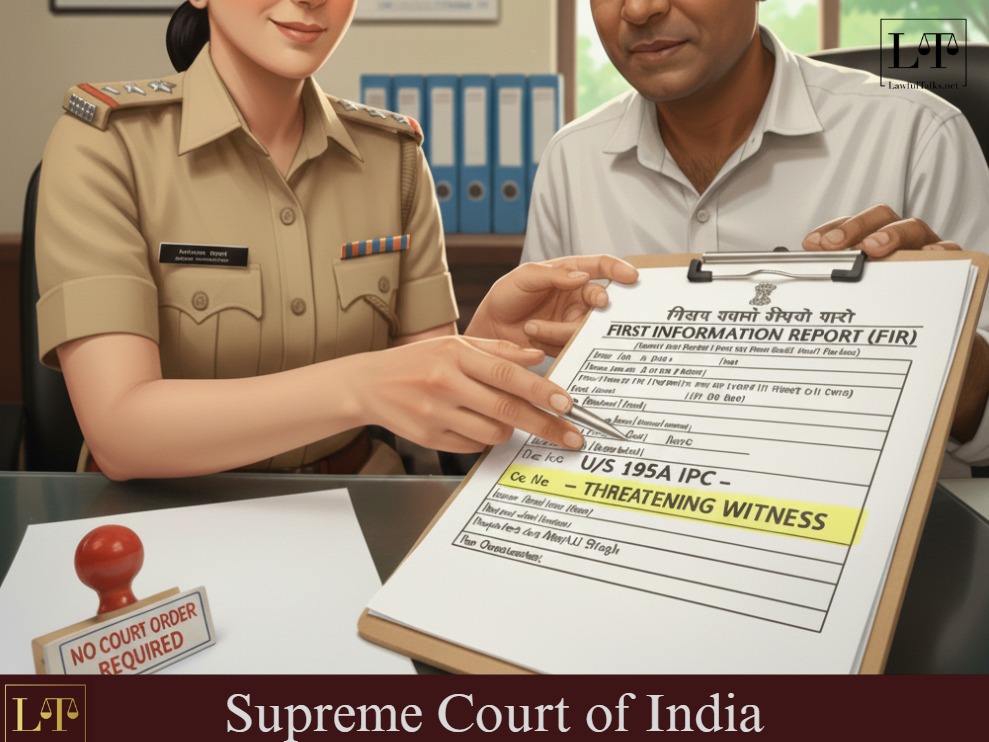Allahabad HC Sets Aside Afzal Ansari's Conviction, Allows Him to Continue as MP

In a significant ruling, the Supreme Court of India has held that the offence under Section 195A of the Indian Penal Code (IPC), threatening a person to give false evidence is a cognizable offence.

This means the police can immediately register a First Information Report (FIR) and begin investigation without waiting for a court complaint or sanction.
The Supreme Court set aside the Kerala High Court’s order that had limited police powers in such cases. The dispute arose when the Kerala High Court granted bail to an accused charged under Section 195A IPC for intimidating a key witness (an approver) in a murder trial. The High Court had held that the procedure under Section 195(1)(b)(i) read with Section 340 CrPC was required to be followed and that only the trial court could register a complaint.
A bench of Justices Sanjay Kumar and Alok Aradhe set aside the Kerala High Court’s decision. The Supreme Court made it clear that threatening a witness under Section 195A IPC is indeed a cognizable offense. Therefore, the police have full authority to file an FIR and start an investigation without needing a prior court complaint.
Rejecting the High Court’s narrow reading of the law, the Court emphasized the special nature of Section 195A IPC.
The Court observed:
“Section 195A IPC was conceptualized as an offense distinct and different from those under Sections 193, 194, 195 and 196 IPC. Those offenses required a complaint to be made only by those named in Section 195(1)(b)(i) CrPC and they were all non-cognizable offenses. However, an offense under Section 195-A IPC was a cognizable offense and pertained to inducing a person to give false evidence by intimidating him or her with threat of injury either to his or her person or reputation or property or to the person or reputation of anyone in whom that person is interested.”
Justice Sanjay Kumar, writing the judgment, also pointed out that forcing a threatened witness to first approach a court would be impractical and burdensome.
The Court explained:
“Requiring that person to go before the Court concerned... and inform it about the threat received, thereby necessitating a complaint under Section 195(1)(b)(i) along with an inquiry under Section 340 CrPC, would only cripple and hamper the process.”
Reaffirming the police’s power to act when such an offense is reported, the Court stated:
“The undeniable fact remains that the offence under Section 195A IPC is a cognizable offence and once that is so, the power of the police to take action in relation thereto under Sections 154 CrPC and 156 CrPC cannot be doubted... It is only by way of an additional remedy that Section 195A CrPC permits the threatened witness or any other person acting on his behalf to file a complaint before the jurisdictional Magistrate.”
By clearly laying down this principle, the Supreme Court set aside the Kerala High Court’s judgment, allowed the State’s appeal, and directed the respondent to surrender before the trial court within two weeks.
Case Title: STATE OF KERALA VS. SUNI @ SUNIL (AND CONNECTED CASE)

Nandani Mishra
Second Year, B.SC LLB, (cybersecurity) Hons, National law University
Latest Posts
Categories
- International News 19 Posts
- Supreme Court 352 Posts
- High Courts 366 Posts




























































































































































































































































































































































































































































































































































































































































































































































